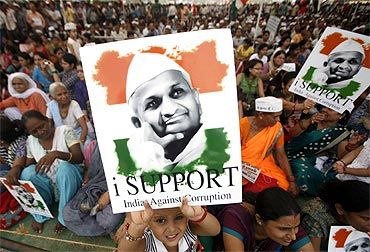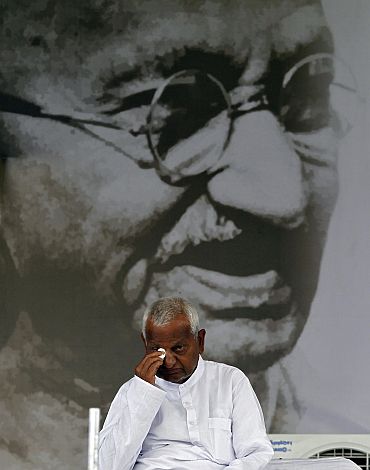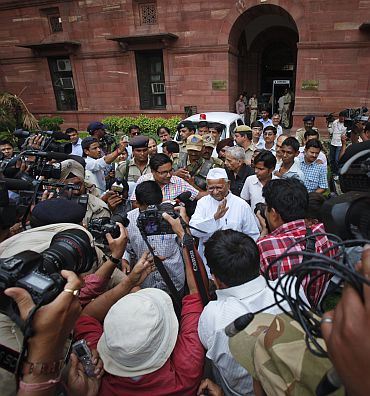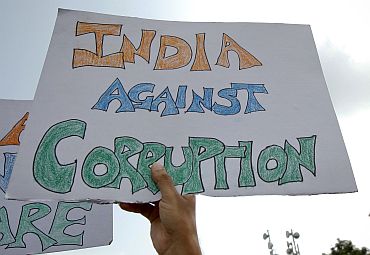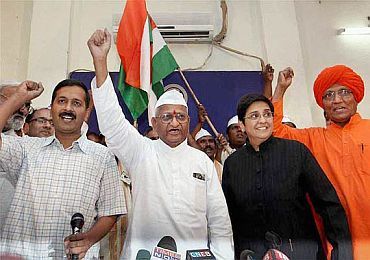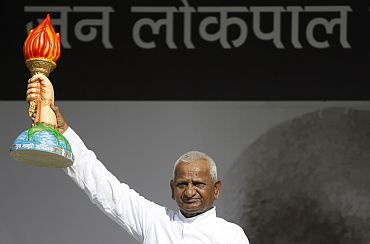 | « Back to article | Print this article |
View: Bring media and NGOs too under Lokpal
Strangely, the Lokpal Bill drafted by all sides is silent on these two powerful sections of our society that continues to shape, reshape and de-shape public opinion. Is that why the media and the NGOs are vociferously supporting the Lokpal Bill, asks M R Venkatesh.
Former prime minister Indira Gandhi used the bogey of the 'foreign hand' to devastating effect. She would blame it on foreign hand even when it came to natural calamities.
Blame it on the innocence of those times, her personality or naivet of her political opponents, Indira Gandhi could afford to blame the foreign hand for all her misfortunes and yet get away.
Decades later it turns out that she was indeed correct. Surely there was a foreign hand that operated in India in those times.
However, it ultimately turns out that the foreign hand was not the American intelligence viz., CIA, as was popularly believed by most, but the soviet intelligence agency: the KGB.
The Mitrokhin Archive, Volume II: the KGB and the World by Christopher Andrew and Vasili Mitrokhin, claims that a huge cache of KGB records smuggled out of Moscow after the fall of communism reveal that in the 1970s, Indira (and by extension India) was one of those countries successfully penetrated by Soviet intelligence.
Crucially, The Mitrokhin Archive also points out to "individuals and media associated with the CPI" who too were reportedly on the payroll of the Soviets.
In short, despite a foreign hand it was a hand that was acceptable to sections of our media and Leftists. That explains their muted response to the issue of our money stashed in tax havens abroad even to this day!
The author is a Chennai-based chartered accountant. He can be contacted at mrv@mrv.net.in
Please click NEXT to read more...
'Foreign hand works through the media'
Last week the foreign hand was back in circulation when Prime Minister Manmohan Singh sought to do an Indira Gandhi. In a reaction to the arrest of social activist Anna Hazare, he said, "There are many forces that would not like to see India realise its true place in the comity of nations. We must not play into their hands."
Simultaneously Congress spokesperson Rashid Alvi raised doubts about a 'foreign hand' being behind Hazare's demand for a stronger Lokpal Bill. "We will have to find out the truth, why the United States is supporting this movement," Alvi had said.
But if you thought all this was sheer political bluster and predictable posturing, hold on. What about the tacit nexus between sections of external forces and our media? What about NGOs -- some of whom are seemingly on the payroll of inimical foreign forces?
Let us not forget that the chatterati, twitterati and glitterati -- who have rallied behind Anna -- are as much inspired by him as the campaign carried out by vast sections of our media and NGOs.
Nevertheless, what is ignored by most is that while large sections of our media and NGOs are independent, significant sections are not. And that is the central point of this discussion.
Who will scrutinise the media, NGOs?
For every story that the media breaks about corruption at high places, there is possibly yet another story that is nixed by the media, obviously for consideration.
Similarly, for every two allegations of corruption by the media, one could be genuine. The other one could possibly be a mere allegation carried out with some quid pro quo.
Not convinced? Consider this. N Murali, the managing director of The Hindu, in a widely circulated letter recently, after a 40-year-long career in the Chennai-based, family-owned newspaper goes on to allege that its editorial section was run like a 'banana republic'.
"It is indeed unfortunate that editorial primacy has been sacrificed at the altar of excessive commercialism and vested interests to pander to the wishes of some of the directors who have a crass disregard of the values The Hindu has always stood for," he adds.
Pointing to the blatant pro-CPI-M and pro-Chinese tilt in coverage, Murali puts the matter in proper perspective when he concludes, "When the media is used as a means to achieve private ends it undoubtedly becomes a calamity."
Remember The Hindu is no ordinary newspaper -- it is held in high esteem by Chennai's intellectual class. That allows someone to fashion the thinking of Chennai's vocal class by influencing editorials and writing columns in The Hindu.
When the truth on the functioning of the newspaper of the class of The Hindu is revealed by its own managing director -- no less -- it is time we take the allegation of foreign hand in the functioning of our media rather seriously.
Is our media independent?
Obviously, the stand of our media on any issue (including the coverage of the Hazare fast) will be suspect and increasingly come under intense scrutiny. Is our media independent?
Is the editorial (in case of print media) or even the choice of the panelists (in case of electronic media) inspired by some foreign forces?
What is depressing to note here is that one of the most heated political debates of recent times -- that on the Indo-US nuclear agreement -- could well have been carried out possibly between American agents and Chinese stooges in India in broad daylight!
And the ideal foil to this media is our NGOs. The most fascinating thing about the NGOs in India is that they are virtually unaccountable to any authority.
That helps them to convert 'private interest' into 'public causes'. Simultaneously, the source of their funding is unverifiable and operations unevaluated. Being un-critiqued, they automatically acquire a halo.
An undeserving halo allows them to go berserk in the media.
In a seminal work on NGOs (aptly titled NGOs Activists and Foreign Funds -- Anti-Nation Industry), author Radha Rajan, along with others, has clinically dissected the world of NGOs, their operations and strategies.
Some of those critiqued in the book are now in the forefront of the latest campaign of India Against Corruption!
'Civil society' does not represent all of us
What is appalling is the fact some NGOs have not even filed their annual returns with the Union home ministry under the Foreign Contribution Regulations Act.
Incidentally, of these 28,351 associations only 17,145 associations (in 2003-04) filed their returns. Subsequently, the ministry had even offered an amnesty scheme to those defaulting NGOs to file their annual return under the said act.
Yet one not many chose to comply with this. However, when it comes to black money, tax havens, accountability, transparency and, of course, lampooning our government, it is the representatives from the NGO sector who are at the forefront of any campaign.
Paradoxically, it is this covert coalition of media and NGO that has acquired a new appellation -- civil society. It is this civil society that seeks to convert Ramlila Maidan into Parliament and Parliament into nothingness.
Let us not forget that our Parliament may have several drawbacks -- but it represents us and possibly our shortcomings.
In contrast while the 'civil society' may claim to represent all of us, the fact remains they do not. Also let us not forget that those who support the Jan Lokpal Bill are no saints as much as those who oppose it are no demons either.
It is in this context that one is constrained to recall the celebrated book Confessions of an Economic Hit Man by John Perkins, which provides shocking insights into how successive American governments have overthrown various regimes in South America, Asia and Africa, merely to suit their economic and political interests.
Perkins confesses that his job was 'to encourage world leaders to become a part of a vast network that promotes US commercial interests. In the end, those leaders become ensnared in a web of debt that ensures their loyalty. We can draw on them whenever we desire-to satisfy our political, economic, or military needs'.
Isn't it time that we get rid of foreign hand along with corruption?
The present day India -- with a pliable media and an NGO industry that is accountable to none -- offers a fertile ground to the economic (or political) hit man to manipulate public discourse in India through awards and rewards.
The foreign hand is probably the only hand at work in India. Of course, it could be that of the Chinese, Americans or Russians. In an infant democracy and an open society one need not necessarily target our politicians, bureaucracy or judiciary at all times to further their cause.
It can be done subtly through an editorial in the media or a campaign orchestrated by an NGO.
Strangely, the Lokpal Bill drafted by all sides is silent on these two powerful sections of our society that continues to shape, reshape and de-shape public opinion. Is that why the media and the NGOs are vociferously supporting the Lokpal Bill?
Let us not forget that an editorial by a daily of repute written for commercial consideration is a corrupt practice as would be a campaign undertaken by an NGO for a consideration.
Given the sweeping power of the media and enormous influence of NGOs should we not bring both the media and NGOs within the scrutiny of the Lokpal? Isn't it time that we get rid of foreign hand along with corruption?
It is a pity that the Congress spokesperson could not explain the idea of foreign hand better, especially in the context of a complicit media and unaccountable NGOs.
Is it constrained by the fact that the prime minister is a World Bank pensioner and its president has her origins abroad? Your guess is as good as mine.
